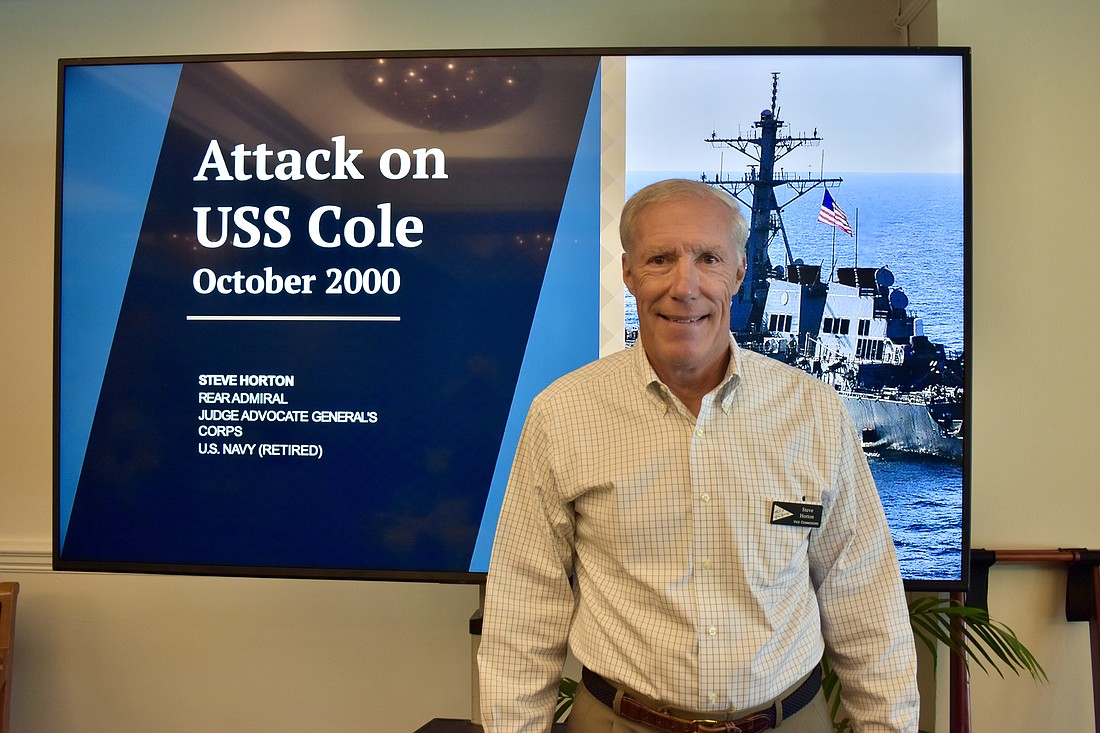- May 2, 2024
-
-
Loading

Loading

The Bird Key Yacht Club is welcoming a new commodore. Lisa Adams is retiring, and Steve Horton will take her place as of July 1.
Horton is the current vice-commodore and is a retired lawyer and U.S. Navy JAG Corps rear admiral. He also worked for Boeing and was the principal legal advisor on the USS Cole Commission report. On April 6, he spoke to about 100 people at the club’s Seafarers lecture series about his experience on the commission.
His presentation was delivered in three parts: The attack, investigation and co-conspirators. The bombing of the USS Cole was the first al Qaeda terrorist attack before 9/11. At 11:15 a.m. on Oct. 12, 2000, two men approached the ship in a 20-foot, fiberglass motor boat stocked with explosives.
They smiled and waved to officers, who had machine guns and assault rifles slung over their shoulders. Other boats were delivering mail and supplies that morning. The men didn't appear to be a threat.
Horton walked to one side of the ballroom and pointed to the door on the other side. That’s 40 feet, he said. Then, he pointed up to the ceiling.
“This is about 10 feet. Multiply it by four times, so you sort of get the scope of this explosion,” Horton said. “The floor, what we call the 'deck,' the floor of the galley was pushed all the way into the ceiling. It was indistinguishable between the ceiling and the floor.”
The bombing caused 39 injuries and 17 deaths. It took the Navy three days to retrieve the bodies because they were trapped in between.
After the FBI investigated criminal culpability and the Navy investigated the actions of the crew, the Department of Defense formed the commission to assess the unity of effort by the U.S. government.
“We had a total of 45 officers from all services. We did an immediate site visit to Yemen and the ship. We had two retired four-star commissioners, and I went to every interview they did at every site visit, so it was just the three of us,” Horton said. “The idea was that my group, and I had two other lawyers and an intelligence officer, would do all the drafting of the report for the commission, and I would be sort of the corporate knowledge and corporate history as we went through these interviews and the site visit.”
He described the crew as dejected and said stepping onto the ship was one of the most depressing days of his life. What the commission ended up finding was an overload of intelligence that couldn’t be assimilated into practical use and a dire need for more Arabic translators and traditional, human spies.
Because the U.S. had become so adept at intercepting Soviet communications, spies were becoming obsolete, except that al Qaeda doesn’t operate anything like the Soviets.
The USS Cole suicide bombers had already attempted an attack and failed. Before and after, they didn’t text or gab on the phone about it, and they weren’t tipped off on the Cole's arrival. They were lying in wait, secretly surveilling that port every day, for their next opportunity.
When moving into the final segment on co-conspirators, Horton put a quote by President George W. Bush after 9/11 up on the screen, “Whether we bring our enemies to justice, or bring justice to our enemies, justice will be done.”
Horton went over a list of al Qaeda terrorists and updated the crowd on whether they were dead or alive or in Guantanamo.
“It took 19 years to bring justice to this group of terrorists, but justice has been served, and it’s really attributed to the FBI, the intelligence agencies, the CIA and the military relentlessly hunting down the terrorists and bringing them to justice,” said Horton. “None of this is earth shattering today, but it was back at the time.”